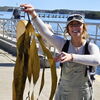Processing Your Payment
Please do not leave this page until complete. This can take a few moments.
Mushroom business grows from new technology
A new type of cleanroom, complete with employees wearing protective bunny suits, is situated amid the rolling hills and farms of Springvale, in York County. But instead of manufacturing semiconductors or other electronic devices, startup company Farming Fungi LLC is growing organic, culinary mushrooms indoors to assure a year-round supply of fresh produce.
“Our target audience is millennials [20-to-30 year olds], who have different buying habits than baby boomers and Generation Xers. They buy organic and local, and will pay a little more for higher quality,” says John Sharood, CFO, from one of the two barns the company rents near Sanford. Sharood, a manufacturing automation consultant, and his son, Robert, an organic farmer, run the company.
They recently started growing mushrooms in the 4,000-square-foot facility, and plan to ship the first harvest to local restaurants and Whole Foods market in Portland at the end of January 2013 under the Mousam Valley Mushrooms brand. Their target market area is a day's drive from southern Maine, extending from New York and southern New England to northern New England and Montreal.
To get off the ground, Farming Fungi received a $24,990 grant from the Maine Technology Institute, which it matched with $61,087 of private funds, to develop software and control systems to manage the mushrooms' environment and to trace lots of finished produce. The control system handles the sterile environment required to grow the organic culinary mushrooms by automatically controlling temperature, humidity and air flow. It also helps keeps the mushrooms free from pests and germs, and manage their growth or “fruiting.”
Additionally, the software keeps a database of raw materials, environmental conditions and other factors that affect a fungi's growth and allows the Sharoods to trace each mushroom lot from spore to market.
“It's a totally unique feature,” says John Sharood. “We'll be able to scan a pound of mushrooms and know everything about its genealogy and growing conditions.”
He says he and his son were motivated to develop the lot-tracing software because nothing was designed for small growers such as themselves.
“We couldn't buy it — no one offers anything like it,” he says.
A growing niche
In their business plan submitted to MTI, the Sharoods note that specialty, organic mushrooms is the fastest-growing segment of the U.S. mushroom market, which had total sales of $1.02 billion in 2010-2011, up 10% from the prior season, amounting to 862 million pounds. Most of that crop was Agaricus mushrooms, also known as Portobello mushrooms, grown by a handful of specialized large national producers.
Specialty mushrooms are non-Agaricus mushrooms, including variations of shiitake and oyster. The estimated sales for such commercially grown specialty mushrooms in 2010-2011 totaled $50.1 million, up 27% from the 2009-2010 season.
Farming Fungi intends to use its proprietary, fully automated fruiting technology and recipes to grow native Maine mushroom varieties. The first three types of mushrooms in the pipeline are oyster, shiitake (not native to Maine) and lion's mane. But the Sharoods intend to develop a dozen varieties over the years, including chicken-of-the-woods, a brilliant yellow-and orange striped variety that has the texture of meat. When grown in the wild, it draws both bacteria and beetles.
“No one sells chicken-of-the-woods grown in a controlled environment,” says John Sharood.
Mushrooms traditionally have been grown in long, 100-foot by 8-foot troughs lined with straw and cow manure in states such as Pennsylvania. The mushrooms are generally picked before they are ripe and shipped to markets.
The Farming Fungi system uses ground organic hardwood trees as a substrate to grow the mushrooms. The substrate is put into small bags fitted with filter patches to protect the seeds and mushrooms from developing mold — a problem in traditional growing methods, according to the Sharoods. The growing method also will help them keep the products free of pesticides.
“We make six-pound blocks of sawdust and wood chips and put the mushroom spores into it, then seal it in a bag,” explains Robert Sharood, president and chief mycologist at Farming Fungi. “We use special environmental conditions in light, temperature and humidity to grow the mushrooms, so we apply a completely different growing process.”
He says there currently is no year-round supplier of mushrooms in Maine, though there are two other small suppliers in the state. And, he notes, the sawdust can be resold as compost once it is used three times for fruiting.
The Sharoods say their mushrooms will meet requirements of the U.S. Department of Agriculture, the Maine Organic Farmers and Growers Association, and other organizations. The product's packaging uses compostable wood and wood-based cellophane, says Robert Sharood, a combination that is better for the mushrooms. The company expects to produce 1,500 pounds per week by the end of 2013, and potentially could grow up to 3,000 pounds per week in its rented space.
A growing taste
The push for fresh, organic, sustainably grown mushrooms has drawn the attention of Whole Foods in Portland, Farming Fungi's launch customer
“They're local,” says Whole Foods Produce Manager Jim Esposito of the Portland store's choice to sell the mushrooms. “It's part of the way we do business.”
“We're trying to show you can grow a better product for about the same price as conventional produce,” says John Sharood.
Farming Fungi researched optimal mushroom species for several years, and cultured a variety of native Maine specialty mushrooms on Maine-sourced organic hardwoods. So far, the company has been able to consistently produce chicken-of-the-woods, lion's mane, black poplar/pioppino, beech, oyster and shiitake mushrooms.
John Sharood says variety is important to satisfy the market.
“[Our customers] want a variety, they want a mix,” he says. “Our marketing plan is to price the mushrooms so they are more broadly consumed and not as an ultra high-end specialty item.”
For instance, chicken-of-the-woods mushrooms are typically only available seasonally as a foraged product that costs $25 per pound or more. John Sharood says Farming Fungi's indoor, organically grown chicken-of-the-woods mushrooms could command that price, but they will sell them for less.
“We're more interested in commercializing them widely,” he says.
Potential competition comes from three local commercial producers: Shady Oaks Inc. of Newburyport, Mass., which produces several varieties of oyster mushroom grown indoors on straw; Oyster Creek Mushroom in Damariscotta, mainly an outdoor shiitake mushroom grower and a marketer of wild foraged mushrooms; and Shiitake Farm in Rumford, which sells premium log grown shiitake in season, according to Farming Fungi's business plan. There also are about a dozen wild foragers who collect and sell mushrooms in Maine.
Long term, the company hopes to expand into other parts of the United States, including southern California and the South and Midwest. It will focus on same-day delivery to stores, restaurants and institutions, and it plans to partner with local restaurant/institutional food distributors to reach more restaurants and local organic food retailers. It also plans to sell direct to large, high-end organic food retailers like Whole Foods Market and Delhaize (Hannaford), according to the company business plan.
For now, John Sharood says the company is focused on farming and getting its produce to market; he expects there will be nine employees by the end of 2013. Perhaps at that point he'll consider licensing Farming Fungi's systems control software.
“Coming from an engineering background, this is the kind of [technology] you always want to know about,” he says.
Lori Valigra, a writer based in Harrison, can be reached at editorial@mainebiz.biz.
















Comments